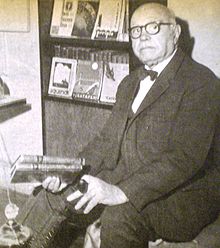Juan Filloy
Juan Filloy (born August 1, 1894 in Córdoba , † July 15, 2000 ibid) was an Argentine writer .
Life
Juan Filloy was the fourth of five children of European immigrants - the father was Spanish , the mother French - in the megacity of Cordoba. His parents ran a small general store on the outskirts of town.
Filloy decided to study law at the Universidad Nacional de Córdoba and, after graduating in 1920, moved to the Río Cuarto in central Argentina . The short stay he initially planned turned into 64 years during which he worked as a lawyer and judge. In 1984 Filloy went back to his hometown. His wish to become a writer of three centuries, expressed on his 100th birthday, was not fulfilled: he died in 2000 at the age of 105 while he was taking a siesta.
plant
Filloy was one of the strange and mysterious loners on the Argentine literary scene. His books were mostly published as private prints , exceptionally by smaller publishers, but he refused to go to the great literature business and its center Buenos Aires . Between 1939 and 1967 he did not publish a single work.
His oeuvre comprises 49 books, including 11 novels. Many of them are interspersed with allusions, sarcasm, and polemics. It is also noticeable that most of them have a title made up of seven letters. Among the most important are Op Oloop (1934, 1967 and 1997), Caterva (1938 and 1992) and the short story volume Los Ochoa (1972).
For sixty years he worked for the newspaper El Pueblo , in which glosses , art and theater reviews of him appeared. His exceptional position in Argentine literature is underpinned by a collection of 14,000 palindromes that he built up over the decades. A selection of these palindromes was published in Argentina under the title Karcino (1988 and 2005).
In his home country Argentina, it was long considered a “secret classic”. His books have only been reissued since the mid-1990s; in 2005 and 2006, Juan Filloy's novels, Op Oloop and Caterva, were published for the first time in Spain by Siruela. Translations into Dutch of these two titles by Ari van der Waal have appeared earlier; since 2002 Op Oloop has also been available in a German translation by Silke Kleemann.
Honors
- 1986 Ordine al Merito della Repubblica Italiana
- 1989 Dr. hc of the Universidad Nacional de Río Cuarto
- 1990 Ordre des Arts et des Lettres
- 1995 Plume d'honneur of the PEN Club
Works
Spanish
- Periplo (1930)
- ¡Estafen! (1931 and 1997)
- Balumba (1932)
- Op Oloop (1934, 1967, 1997 and 2005)
- Aquende (1935 and 1996)
- Caterva (1938, 1992 and 2006)
- Finesse (1939)
- Ignitus (1971)
- Yo, yo y yo (1971 and 2007)
- Los Ochoa (1972 and 2003)
- La potra (1973 and 2003)
- Usaland (1973)
- Vil & Vil (1975 and 2005)
- Urrumpta (1977)
- Valley cual (1980)
- L'Ambigú (1982)
- Karcino (1988)
- Gentuza (1991 and 2006)
- Mujeres (1991)
- La purga (1994 and 2004)
- Elegías (1994)
- Esto fui (1994)
- Sagesse (1995)
- Don juan (1995)
- Sexamor (1996)
- Sonetos (1996)
- Decio 8A (1997)
German
- Op Oloop . Novel. Tropen, Cologne 2002. German by Silke Kleemann. ISBN 3-932170-51-2
- Op Oloop . Novel. Suhrkamp, Frankfurt 2005. German by Silke Kleemann. ISBN 3-518-45677-6
literature
- Mónica Ambort: Juan Filloy. El escritor escondido . Op Oloop Editorial, Córdoba 1992.
- Daniel Barros: Ensayos alrededor de las letras y el pensamiento . Editorial Dunken, Buenos Aires 2000, ISBN 987-518-343-1 .
- Stella M. Colombo: Juan Filloy. Libertad de palabra; textos críticos y antología . Fundación Ross, Rosario, Santa Fee 2000, ISBN 950-9472-88-3 .
- Hector Gonzalez Quintana: Anatomia de la Potra. Hermeneutica de la novela "La Potra" by Juan Filloy . University Press, Río Cuarto 1996, ISBN 950-665-035-7 .
- Manuel Graña Etcheverry: La poética de Juan Filloy en “Balumba”. Seguido de correspondencia con Juan Filloy . Editorial del Copista, Córdoba 2001, ISBN 987-9192-78-8 .
- Sandra Gasparini: En nombre de la Ley. Juan Filloy y la década infame . In: Jitrik Noé (ed.): Atipicos en la litteratura latinoamericana . Oficina de Publicaciones, Buenos Aires 1997, ISBN 950-29-0368-4 .
- Candelaria de Olmos: Filloy en tres tiempos. Correspondencia en torno a Balumba . Alción, Córdoba 2006, ISBN 987-1359-01-2 .
- Haydée T. Reigadas: Juan Filloy, narrador. El talento que eligió el silencio . Dissertation, University of Los Angeles 1982.
Web links
- Literature by and about Juan Filloy in the catalog of the Ibero-American Institute of Prussian Cultural Heritage, Berlin
- Literature by and about Juan Filloy in the catalog of the German National Library
- Literatura argentina contemporánea
Remarks
| personal data | |
|---|---|
| SURNAME | Filloy, Juan |
| BRIEF DESCRIPTION | Argentine writer |
| DATE OF BIRTH | August 1, 1894 |
| PLACE OF BIRTH | Cordoba , Argentina |
| DATE OF DEATH | July 15, 2000 |
| Place of death | Cordoba , Argentina |
